There are many reasons you might be looking for free coding classes.
Maybe you’re thinking of transitioning careers and want to teach yourself to code. Before investing in a coding bootcamp or paid program, you might just want to see if you even like coding. Or maybe some coding skills would help you in your existing field?
Whatever the reason, this article will go through what to look for in a free coding course. While the range out there is very wide, here we’ll focus on web development offerings.
Below you’ll find nine free courses to help you on your journey. For each course there’s a description of the content and format to help you decide if it’s the right option for you.
If you want to jump straight to our top nine, or if there’s a certain section you’d like to skip ahead to, just use the clickable menu:
- Before you start
- Nine of the best free coding classes
- What you should look for in free coding classes
- Final thoughts
1. Before you start
One important thing to keep in mind when beginning your coding journey is don’t get too caught up in what specific technologies you learn at the very beginning. Oftentimes people can get so focused on deciding where to start, that they never manage to start at all.
There is no perfect first tutorial. In the end, it’s better to just dive in and do it. No matter which course you take, you’ll get a basis and have a better idea for your next steps at the end.
As you gain knowledge and perspective, you can pivot and adjust based on what you’ve learned about the field.
2. Nine of the best free coding classes
So, without further ado, here are some of the top free coding classes out there, in no particular order:
CareerFoundry Web Development Short Course
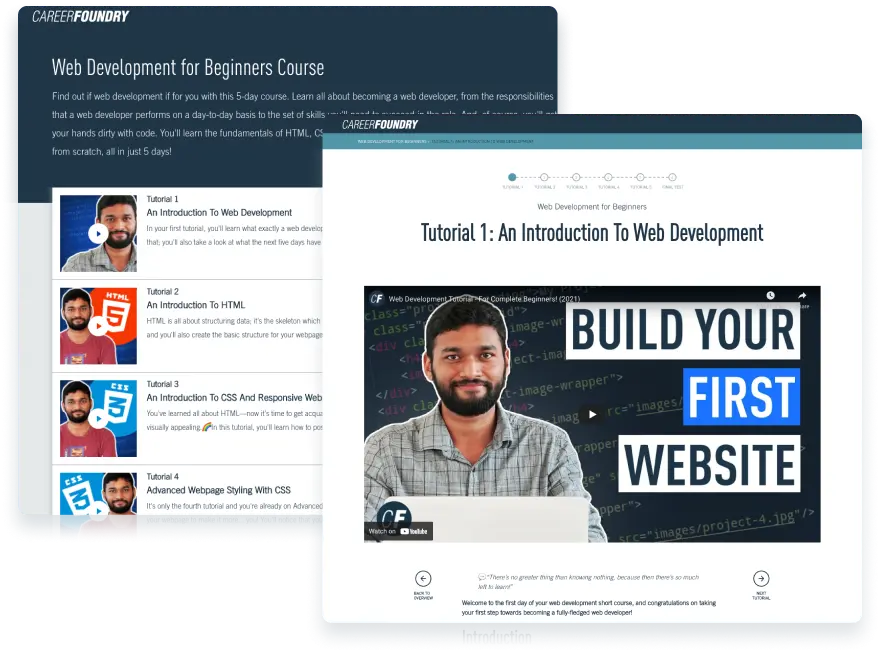
Looking for a short overview of the field of web development? CareerFoundry covers what developers really do and what the industry is like. They go over HTML, CSS, responsive webpages, and JavaScript basics. By the end you’ll code your own website using the concepts you’ve learned.
Maybe you’re trying to understand what coding even is and if the field is a viable option for you. If other programs seem like too big of a time commitment, and you want to first discover if programming is worth your time, these free coding classes are a great option.
You can get a peek at the first lesson of the short course in this video, Abhishek Nagekar, web developer at Mozilla, introduces you to frontend development:
You’ll get five 15-minute daily lessons, just like this one. There are also exercises, as well as information about changing careers. If you want a straightforward overview before diving in deeper to see if coding is right for you, give this a try.
freeCodeCamp
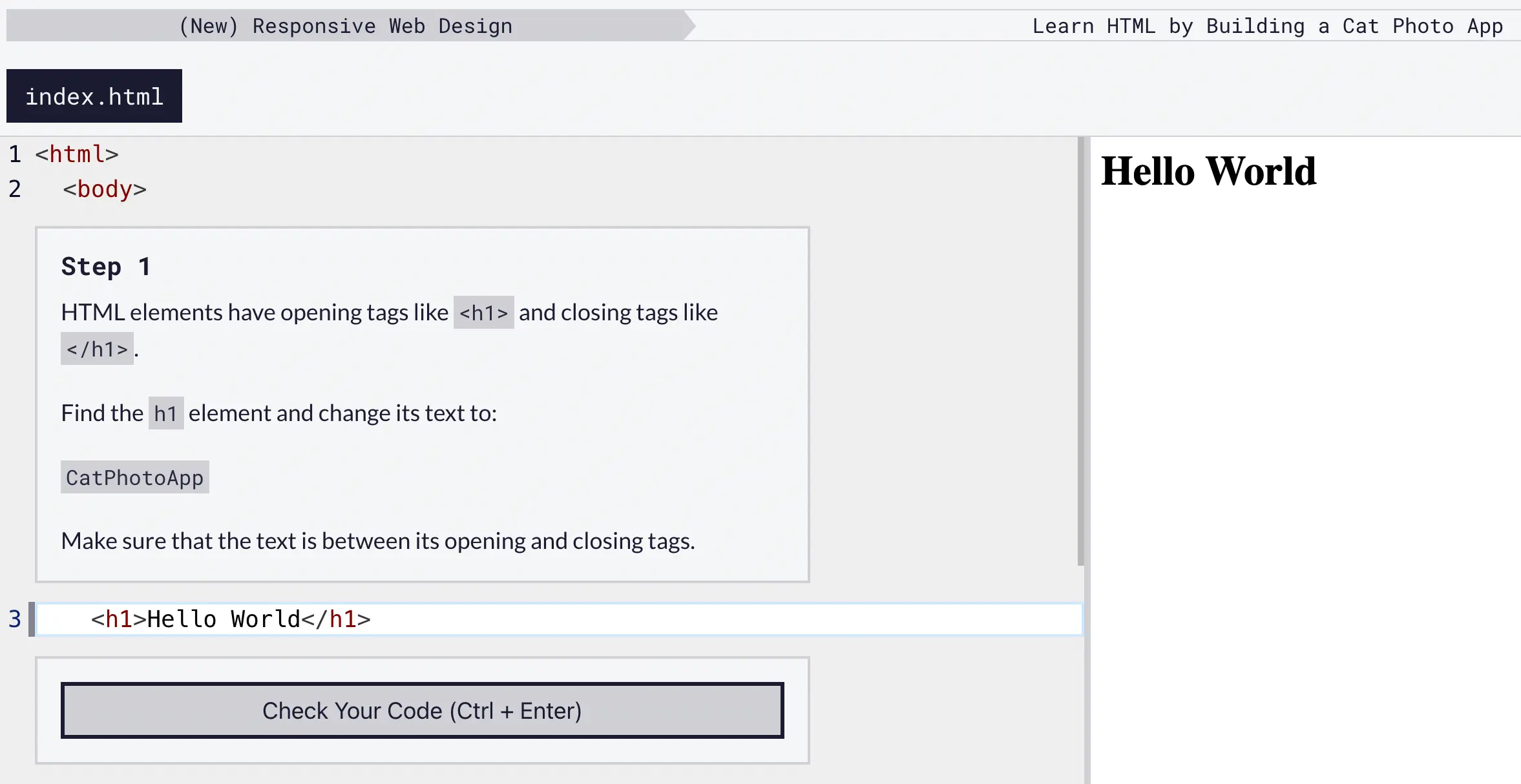
freeCodeCamp is a free, online, self-paced coding bootcamp. There are many paths you can choose: web development, quality assurance, machine learning, information security, and more. If you’re unsure where to start, best to begin with the first certification in responsive web design.
Their courses are structured around small, digestible amounts of new information. Using that, you immediately solve a small exercise. At the end of each certification, there are five projects. If you build them all and get their tests to pass, you’re eligible for that certification.
The benefit of this is that you are ready with a web development portfolio of your work by the time you finish. They also have very supportive forums when you get stuck. If you want to be more social, most major cities have local freeCodeCamp study groups you can join as well.
Once you’re certified, they also have a course on coding interview prep. This is great as coding interviews are a skill of their own, as you’ll see in our guide to web developer interview questions.
This course is great if you’re interested in coding, or already considering a web development bootcamp. Whether you want to do their whole program on your own, or use freeCodeCamp to see if you like web development before investing in a more structured alternative, it’s a great option.
CS50’s Introduction to Computer Science
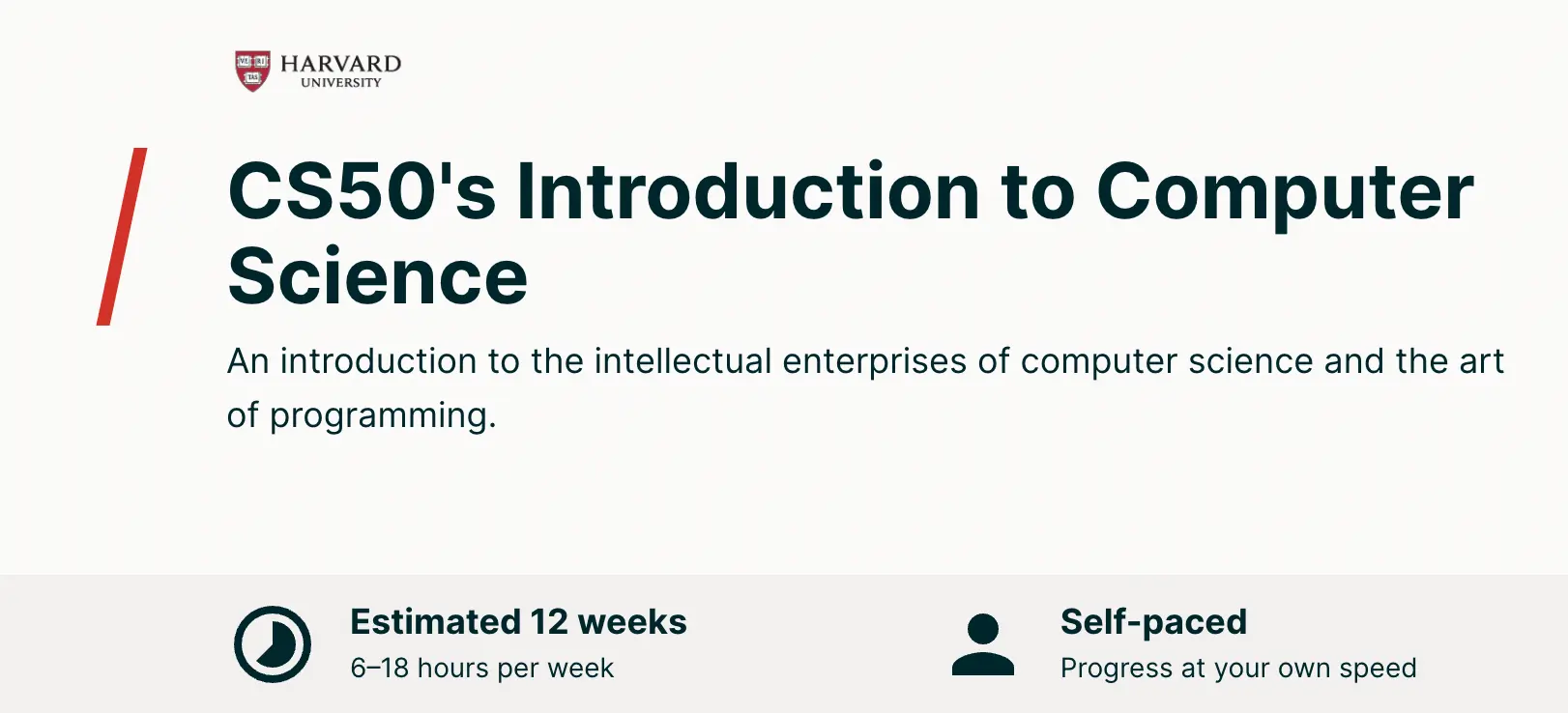
Want to learn Computer Science directly from the Ivies? Consider CS50x, Harvard University’s introduction to computer science and the art of programming. It’s a popular online entry-level course. If you want to dip your toes into the field and see if it’s for you, this is a great option.
CS50x teaches students how to think algorithmically and solve problems efficiently. Topics covered are: abstraction, algorithms, data structures, encapsulation, resource management, security, software engineering, and web development. Languages include C, Python, SQL, and JavaScript (plus CSS and HTML).
The problem sets come from the real-world domains of biology, cryptography, finance, forensics, and gaming. Regardless of which path you go, this course will set a great basis and teach you to think like a software engineer. If you’re unsure which area of programming you’re interested in, you can try lots of different things out here.
The course takes an estimated 12 weeks, though it’s self-paced. You are eligible for a certificate if you pass the nine programming assignments and final project.
MongoDB University

Most free coding classes focus on the frontend. If you’re curious about backend development, this is a good place to start. As we explain more in our guide to the differences between the frontend and backend, the latter term means the data layer of a web application, not what you see in the browser.
MongoDB is a type of NoSQL database that’s widely used by analysts and web developers alike. They offer a course called MongoDB University on their website. This course covers what a database is and different ways to search, create, and analyze your data. You can also learn more about authentication and authorization, which are great skills and concepts for your CV.
The courses are practical, with video lectures, labs and quizzes. Everything is self-paced. You can earn a certificate of completion at the end if you pass the labs and final exam. The MongoDB Basics course takes eight and a half hours, according to their website.
Skillshare Coding for Beginners
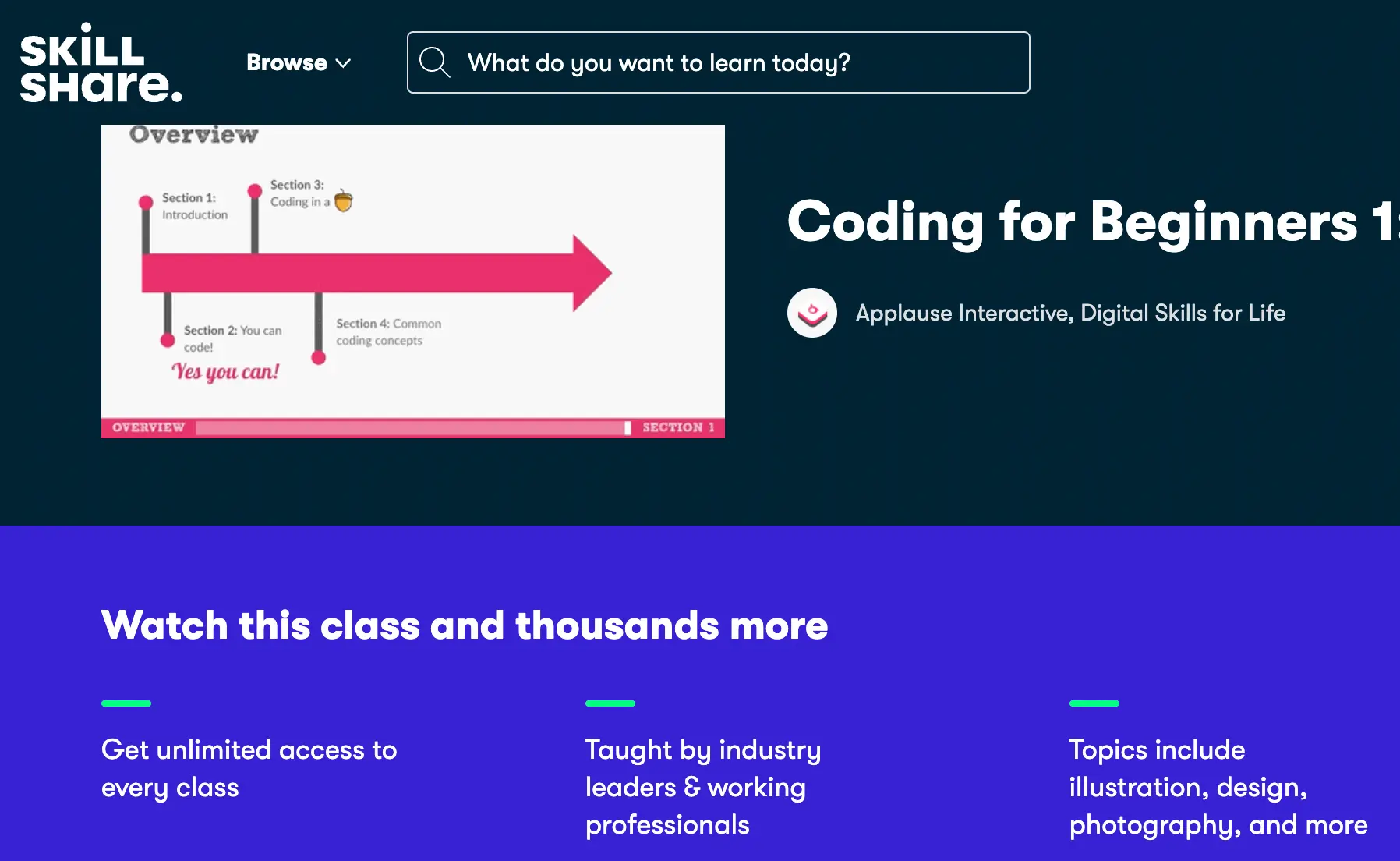
This course focuses on complete beginners. If you are thinking about learning a specific coding language, but don’t want to commit to one specific path yet, this may be a good option. Coding for Beginners introduces you to common coding concepts.
You’ll use these concepts in whichever programming language you learn in the future. That way you have an overview before you start mastering a dedicated language and its syntax.
The course includes 30 lectures with seven hours of video, tests, and assignments. At the end, you’ll complete a beginner level project building a simple app in both Scratch and Python.
Codecademy Learn Java
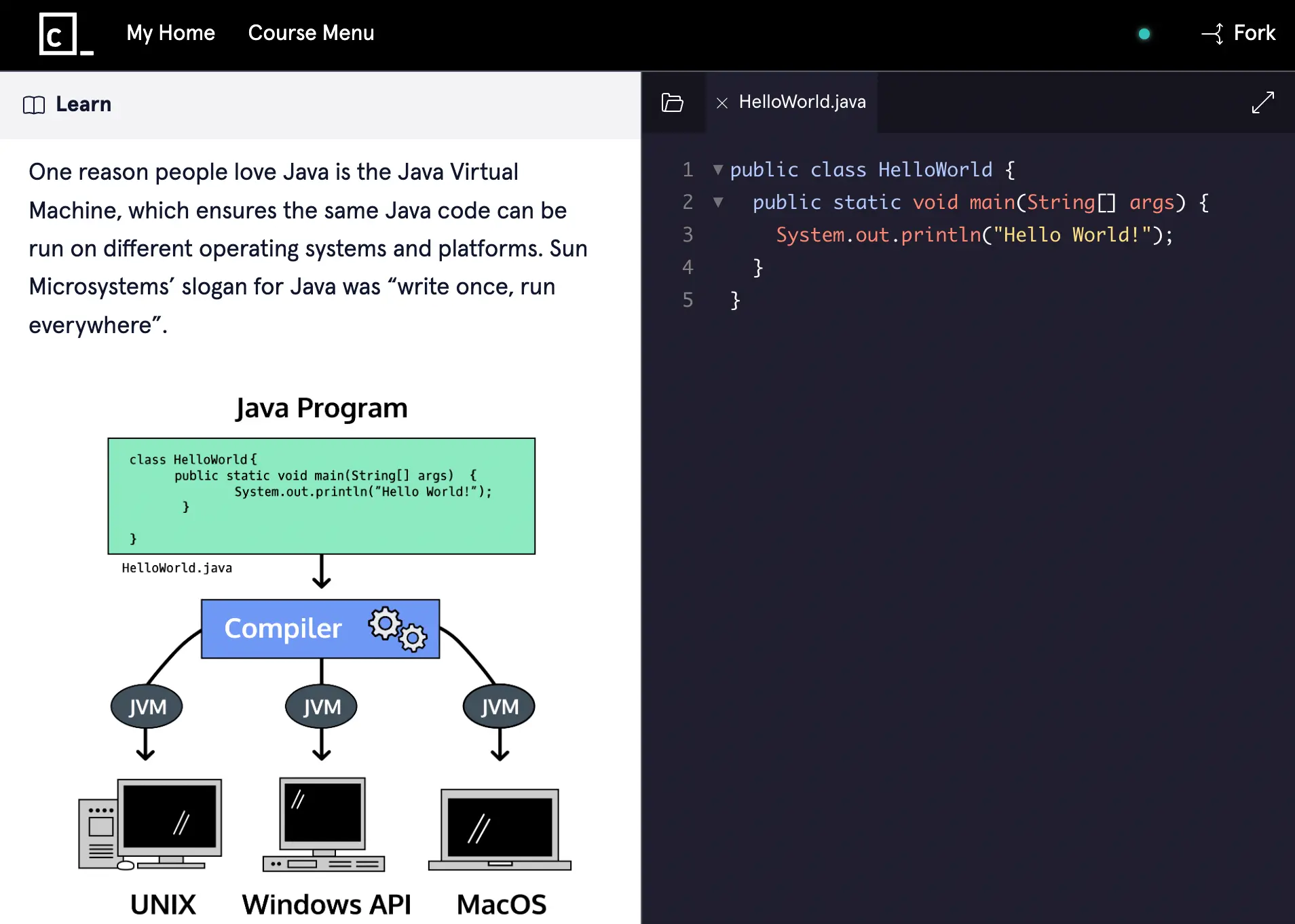
Java can be one of the more dreaded languages to learn, but it is nonetheless an important one. So what better way to learn it than for free with the help of an excellent platform?
Codecademy’s user-friendly, varied platform makes it a very enticing one for budding coders. They have a huge catalogue of free coding classes and paid resources via their Pro collection, which come with certificates of completion.
This course is composed of eleven different coding classes, beginning with Java and Object-Oriented Programming (we’ve created a beginner’s guide to OOP too if you need to brush up). You’ll go through loops, string methods, as well as how to debug Java code, to name but a few.
University of Toronto Learn to Program: The Fundamentals

If you search about online you’ll find more than a few free coding classes provided by top-class universities around the world. This one, taught by seasoned lecturers from their Department of Computer Science, starts by giving you an introduction to Python.
We’ve already talked about why you should learn Python, but here’s even more encouragement. According to the Stack Overflow Developer Survey 2023, Python is the third-most popular programming language for those learning to code, after HTML/CSS and JavaScript, and the fourth-most-used by pro developers.
This course is split into seven different free coding classes and hosted on the popular learning platform Coursera. In total it takes 25 hours to complete, and can be divided up weekly or even quicker, depending on your schedule.
In it, you’ll have a gentle but comprehensive introduction to Python, including:
- variables
- functions
- strings
- Boolean statements
- for loops
- fancy string manipulation
- while loops
- tuples
Classes consist of videos, assignments, and quizzes.
Project-Based Learning Resources on GitHub

A huge part of learning the fundamentals is learning by doing.
These days in the age of scream-y TikToks proclaiming “LEARN CODING IN 2 SECONDS!!!!!”, it’s easy for beginners to feel overwhelmed and that they’re not making progress. As well as learning to relax and to actually enjoy the sensation of learning, remembering to work on a project you care about is a key piece of advice.
That’s where this resource list comes in.
In it, a list of free projects have been gathered together, for over 20 languages. These include building a microblog with the Python framework Flask, a machine learning project to predict the quality of wine, to building a retro FPS game with the language Swift.
SheCodes Express
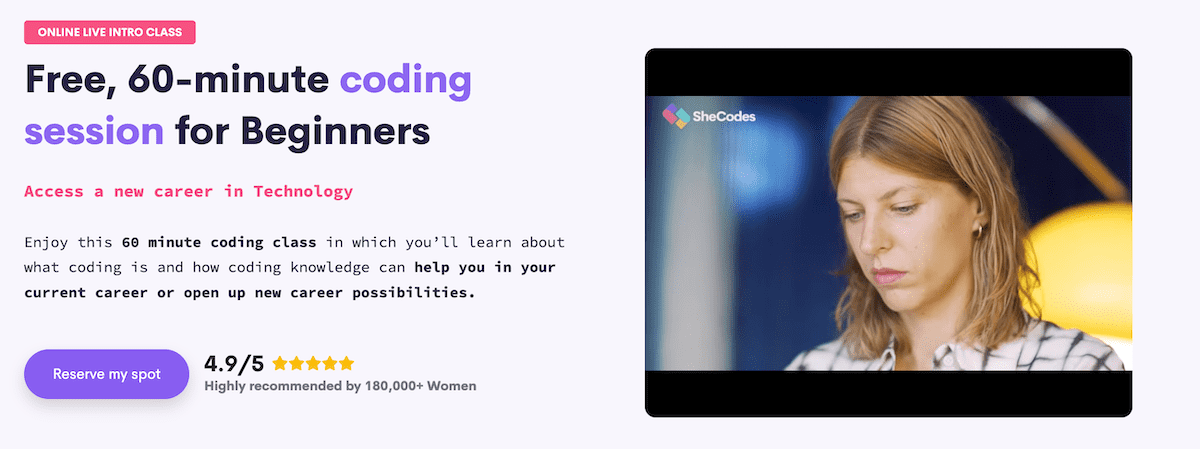
Sure, there are plenty of introduction to coding classes out there online, but one of the differences that makes SheCodes stand out, is that it’s live.
Taking place every few weeks, this 60-minute lesson takes you through HTML/CSS, JavaScript, the code editor VS Code, React, and APIs, among others. You’ll be able to take in live-coding, as well as gain insight into current web development trends, and get the opportunity to ask a pro developer your burning questions.
SheCodes set out years ago in Portugal with the mission of addressing the gender imbalance in development and engineering. Now recommended by more than 180,000 women, they run a series of coding workshops, at a variety of duration from one-week to eight months.
3. What you should look for in free coding classes
Just in case you need more pointers, let’s briefly cover what to look for when choosing a free course. With so much info out there, and everyone promoting their specific way of doing things, it can be hard to pick. Here are some criteria to help you decide:
Structure
Is the course video-based? Project-based? Is it more theoretical? Tap into your understanding of yourself and your learning style.
Be honest with yourself. Will that 100-hour course based on theoretical algorithms just make you fall asleep? Do you get frustrated at videos and often want them to talk faster? Or is seeing everything visually in video form helpful? Do you get overwhelmed when a topic isn’t broken down into small, digestible pieces?
Have a look at the structure of the courses you’re considering and make sure it works for you. Also consider the schedule here re: self-paced work vs. assignments with due dates.
Does it teach the fundamentals?
Technology changes fast. It’s important a course is teaching you the fundamentals rather than only memorizing syntax. This will ensure your success as technologies change and grow.
Support
Is there some type of support for when you get stuck, such as a forum or Slack channel? It’s nice to know you’re not alone when you are stumped on a concept. You’re more likely to succeed learning something new when you have a support network.
Who is the teacher?
What credentials and experience does the teacher or creator of the course have? Have they actually worked in the field?
They don’t have to have a PhD in the subject or anything. Still, someone who has experienced best practices in the web development field first-hand is helpful.
When was the course created?
Again, technology changes fast. Which version of the programming languages and frameworks is the course taught in?
Look up the current version of these technologies on their websites. Within a couple years is usually fine, but don’t choose something published 8 years ago.
Comments
If the course has comments or reviews, have a browse through them. If you see a lot of questions or uncertainty, it may not be the best tutorial for you.
4. Final thoughts
There you have it, nine free coding classes (technically even more!) to get you started on your coding journey.
As we already mentioned, there’s not one perfect starting point for everybody. That said, all of the above courses are great based on your time and interests.
Don’t spend lots of time worrying over which course provider or class to take. What’s more important is just that you begin.
Think you’re ready to take a bigger step than just a few free classes? Then speak to one of our program advisors to see if the CareerFoundry Full-Stack Web Development Program could be a perfect fit for you.
If you’re interested in reading more about the world of coding, check out these articles:

